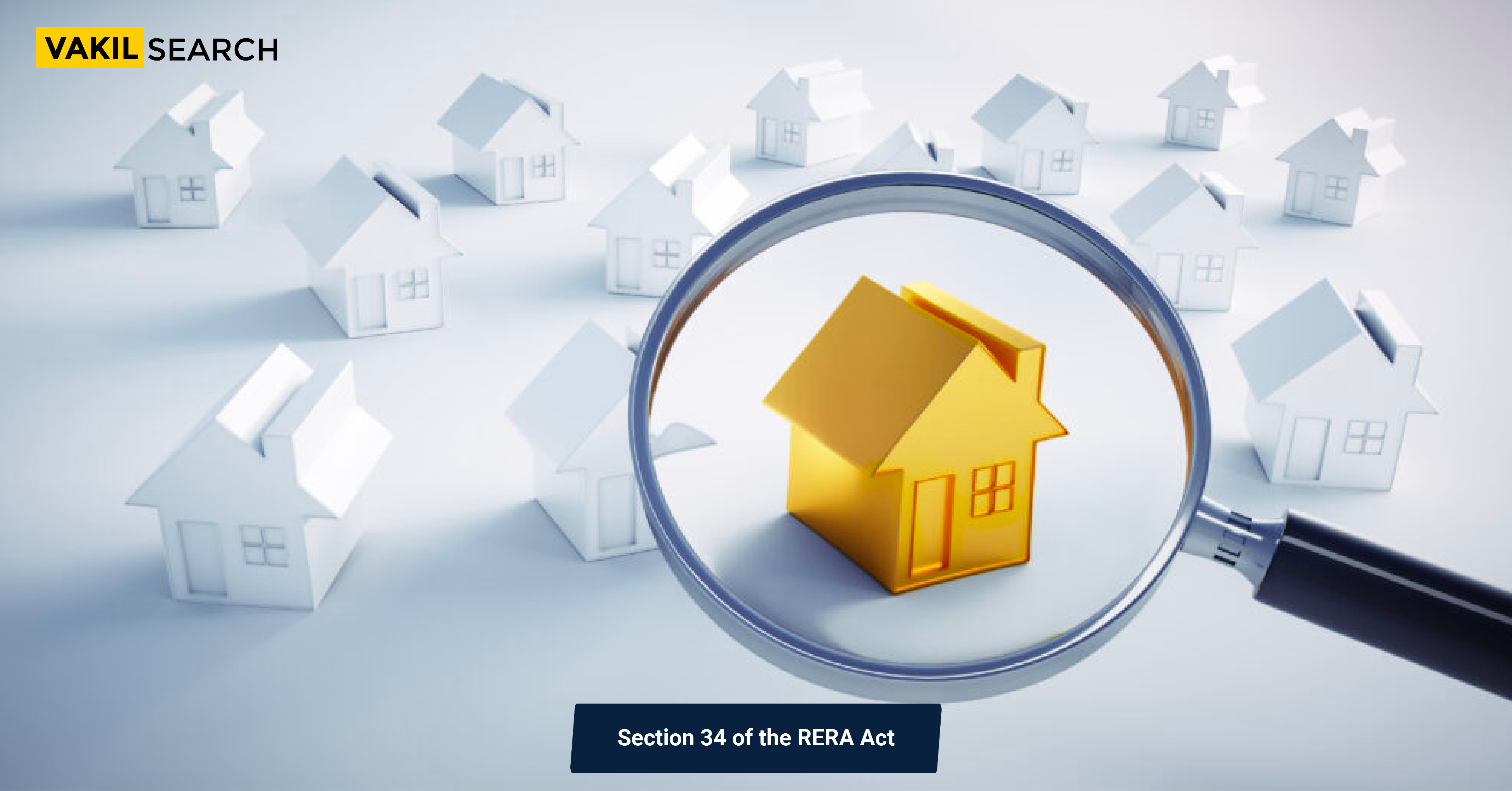Section 34 of the RERA Act empowers the Regulatory Authority to regulate real estate projects and agents. Keep reading to know more.
Overview
When it comes to real estate in India, transparency and accountability are crucial elements that protect both buyers and sellers. To ensure these principles are upheld, the Real Estate (Regulation and Development) Act, of 2016 (RERA Act) was introduced. You Can Know more about Section 34 of the RERA Act.
In this blog post, we will discuss the significance of Section 34 and understand how it impacts the real estate landscape in India.
What is Section 34 of the RERA Act?
The Real Estate (Regulation and Development) Act, 2016, more commonly known as RERA, was a groundbreaking legislation aimed at bringing transparency and accountability to India’s real estate sector. Within this act, Section 34 outlines the essential functions of the Regulatory Authority. Among its many provisions, Section 34 stands out as a crucial component of the regime.
Functions of RERA Regulatory Authority
-
Registration and Regulation of Projects and Agents
Section 34(a) empowers the RERA Authority to register and regulate real estate projects and real estate agents. This is a pivotal function as it ensures that all real estate activities, from residential to commercial, come under the purview of RERA.
-
Creation And Maintenance of a Publicly Accessible Website
Section 34(b) required the Authority to establish and maintain a website containing records of all registered real estate projects. This database provides the public with easy access to vital information about these projects, fostering transparency. Details such as project specifications, developer information, and timelines are made available for public scrutiny.
-
Listing of Defaulters
Under Section 34(c), the Authority is required to maintain a database of defaulters. Promoters who fail to comply with the Act’s provisions may find their names and project details on this list. This serves as a deterrent and a means to inform the public about erring developers.
-
Creation of Real Estate Agent Database
Section 34(d) requires the Authority to maintain a database of registered real estate agents, including those whose registration has been rejected or revoked. This ensures that only qualified and trustworthy agents operate in the market.
-
Fixing of Standard Fees
Section 34(e) empowers the Authority to fix standard fees, ensuring that allottees, promoters, and real estate agents are charged fairly and uniformly for various services. This prevents any arbitrary charges and promotes fairness in transactions.
-
Compliance Oversight
One of the most critical functions of the RERA Authority is found in Sections 34(f) and (g). The Authority is required to ensure that all parties involved, including promoters, allottees, and real estate agents, adhere to the obligations set forth in the Act.
-
Facilitation of Government Mandates
Finally, Section 34(h) requires the Authority to take on additional functions as and when it may be ordered by the appropriate government. This ensures that the regulatory framework remains adaptable and responsive to evolving needs.
Conclusion
Section 34 of the RERA Act plays a pivotal role in ensuring transparency and accountability in India’s real estate sector. By registering and regulating projects and agents, maintaining accessible databases, and enforcing compliance, the RERA Authority empowers both buyers and sellers in making informed decisions.
FAQs
What are the responsibilities of the Promoters?
According to Section 11(4) of the Act, the promoter is responsible for: Fulfilling all obligations towards allottees, association of allottees, or rules and regulations under the Act until all apartments are conveyed to the allottees. Obtaining a completion certificate or occupancy certificate from the competent authority and providing it to allottees or the association of allottees. Obtaining a lease certificate if the project is on leasehold land. Offering essential services at reasonable charges until the association of allottees takes over. Facilitating the formation of an association or society of allottees within three months of the majority of allottees booking their apartment/plot. Executing a registered conveyance deed in favour of allottees, granting them the undivided proportionate title in common areas to the association of allottees. Paying all outgoings until the transfer to the association of allottees. Not creating any third-party interest like mortgages or charges after the execution of the sale agreement, which can affect the allottees' rights.
What are the advertising norms set by RERA for real estate projects?
RERA has strict guidelines for project marketing. As per Section 12, anything shown in the prospectus or based on any model apartment must match the final product. If a promoter makes false statements that result in losses for allottees, penalties can be imposed under the Act. Allottees have the right to withdraw from the project and receive their entire investment, along with interest and compensation, as provided by the Act.
Is it mandatory for the promoter to register the sale agreement before accepting the advance payment?
Yes, as per Section 13 of the Act, the promoter cannot accept an amount exceeding ten per cent of the apartment's cost as an advance payment or application fee without entering into a written sale agreement. The sale agreement should include details such as the possession date, interest rate in case of default, payment particulars, etc.
Can the promoter alter the approved plans or project specifications after approval by the competent authority and disclosure to allottees?
According to Section 14 of the Act, the promoter can only make minor additions or alterations to the sanctioned plan after obtaining approval from the competent authority and disclosing them to the allottees. In the case of major modifications or alterations, the promoter can proceed only after obtaining written approval from two-thirds of the allottees.
How long is the promoter responsible for structural defects in the project/apartment?
As per Section 14(3) of the RERA Act, the promoter is liable for structural defects or specified defects for a period of 5 years from the date of handing over possession to the allottee. To know more about a RERA promoter’s responsibilities reach out to the RERA experts at Vakilsearch.
What are the promoter's obligations regarding the transfer of the project to a third party?
According to Section 15 of the Act, a promoter cannot transfer or assign a majority of rights and liabilities in the project to a third party without obtaining prior written consent from two-thirds of the allottees and the Regulatory Authority.
What are the promoter's obligations regarding the insurance of a real estate project?
As per Section 16 of the Act and notifications by the appropriate Government, the promoter must obtain insurance for the real estate project covering the title of the land and the construction.
What is the timeframe for executing a conveyance deed after receiving the occupancy certificate?
According to Section 17 of the Act, the promoter must execute a registered conveyance deed in favour of the allottee, along with an undivided proportionate share in common areas for the association of allottees, within 30 days from the date of issuance of the occupancy certificate/completion certificate.
Read more:-










